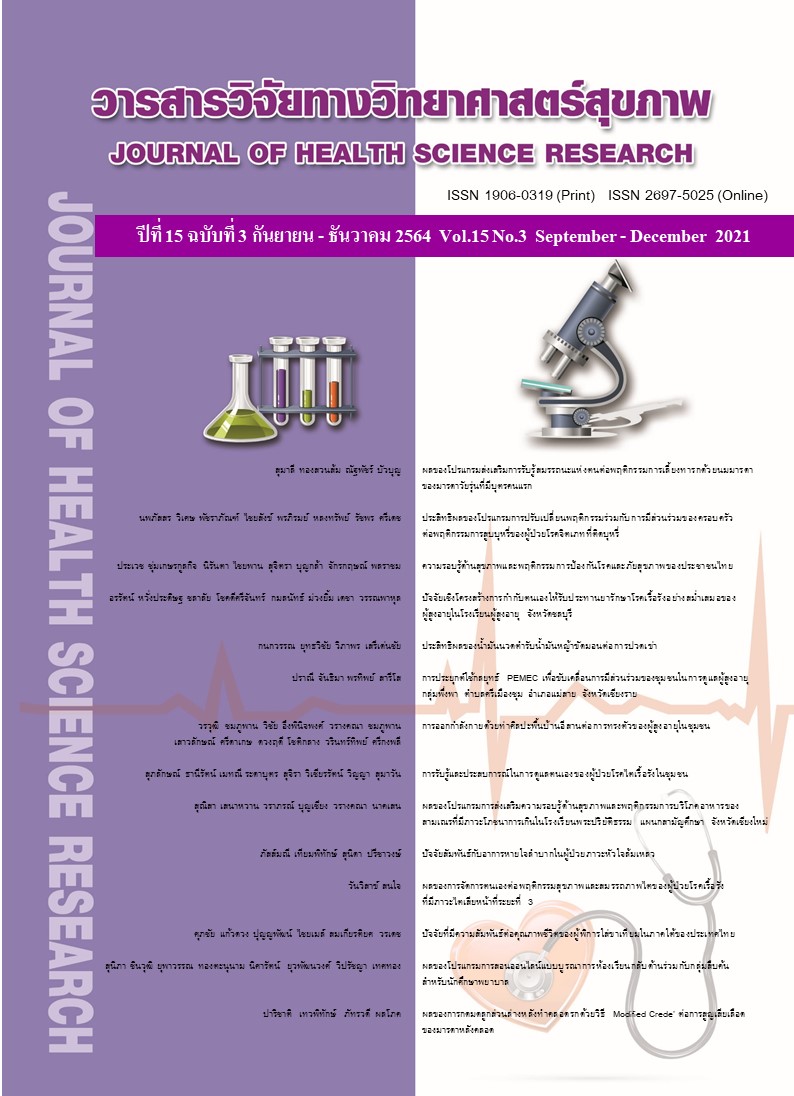ประสิทธิผลของโปรแกรมการปรับเปลี่ยนพฤติกรรมร่วมกับการมีส่วนร่วมของครอบครัวต่อพฤติกรรมการสูบบุหรี่ของผู้ป่วยโรคจิตเภทที่ติดบุหรี่
Main Article Content
บทคัดย่อ
บทนำ : การปรับเปลี่ยนพฤติกรรมเลิกสูบบุหรี่ของผู้ป่วยจิตเภทจะช่วยลดอัตราการป่วยด้วยโรคจากบุหรี่และลดอาการกำเริบของโรค ส่งผลให้ดำเนินชีวิตได้อย่างปกติ
วัตถุประสงค์การวิจัย : ศึกษาประสิทธิผลของโปรแกรมการปรับเปลี่ยนพฤติกรรมร่วมกับการมีส่วนร่วมของครอบครัว ต่อพฤติกรรมการสูบบุหรี่ของผู้ป่วยโรคจิตเภทที่ติดบุหรี่
วิธีการวิจัย : วิจัยกึ่งทดลองแบบสองกลุ่มวัดก่อนและหลังการทดลอง ตัวอย่างคือผู้ป่วยจิตเภทที่ติดบุหรี่ สุ่มด้วยวิธีจับฉลากเข้ากลุ่มทดลองและควบคุมกลุ่มละ 30 คน เครื่องมือที่ใช้ในการวิจัย ประกอบด้วย โปรแกรมการปรับเปลี่ยนพฤติกรรมร่วมกับการมีส่วนร่วมของครอบครัว แบบประเมินสภาวะการติดนิโคติน แบบสอบถามการรับรู้ ความสามารถของตนเองในการเลิกสูบบุหรี่ และแบบสอบถามพฤติกรรมการเลิกสูบบุหรี่ วิเคราะห์ข้อมูลโดยสถิติเชิงพรรณนา และทดสอบที
ผลการวิจัย : พบว่า ภายหลังเข้าร่วมโปรแกรมกลุ่มทดลองมีระดับการติดนิโคตินลดลงกว่าก่อนเข้าโปรแกรม และลดลงมากกว่ากลุ่มควบคุมอย่างมีนัยสำคัญทางสถิติ (p<.05) และภายหลังเข้าร่วมโปรแกรมการรับรู้ความสามารถของตนเอง และพฤติกรรมการเลิกสูบบุหรี่สูงกว่าก่อนได้รับโปรแกรมอย่างมีนัยสำคัญทางสถิติ (p<.05) และลดลงมากกว่ากลุ่มควบคุมอย่างไม่มีนัยสำคัญทางสถิติ
สรุปผล : โปรแกรมการปรับเปลี่ยนพฤติกรรมร่วมกับการมีส่วนร่วมของครอบครัวสามารถช่วยให้ผู้ป่วยจิตเภทที่ติดบุหรี่ลดและเลิกสูบบุหรี่ได้
Downloads
Article Details
บทความที่ได้รับการตีพิมพ์เป็นลิขสิทธิ์ของวิทยาลัยพยาบาลบรมราชชนนี จังหวัดนนทบุรี
ข้อความที่ปรากฏในบทความแต่ละเรื่องในวารสารวิชาการเล่มนี้เป็นความคิดเห็นส่วนตัวของผู้เขียนแต่ละท่านไม่เกี่ยวข้องกับวิทยาลัยพยาบาลบรมราชชนนี จังหวัดนนทบุรี และคณาจารย์ท่านอื่น ในวิทยาลัยฯ แต่อย่างใด ความรับผิดชอบองค์ประกอบทั้งหมดของบทความแต่ละเรื่องเป็นของผู้เขียนแต่ละท่าน หากมีความผิดพลาดใด ๆ ผู้เขียนแต่ละท่านจะรับผิดชอบบทความของตนเองแต่ผู้เดียว
เอกสารอ้างอิง
National Statistical office. The smoking and drinking behavior survey 2017. Bangkok: Pimdeekarnpim; 2018. (in Thai).
Thipphayarangsarit S, Pankrajang P. Tobacco consumption statistics report in Thailand 2018. Bangkok: Charoendee Munkong Printing; 2018. (in Thai).
World Health Organization. WHO global report on trends in prevalence of tobacco smoking 2000-2025, 2nd ed. World health organization; 2018. [internet]. 2021 [cited 2021 Apr 28]; Available from: https://www. who.int/tobacco/publications/.
Marthers CD, Loncar D. Projections of global mortality and burden of isease from 2002 to 2030. Plos Med. 2006;3(11): e442. doi: 10.1371/journal.pmed.0030442.
Sittirak N. Siriraj Psychiatry DSM-5. 3rd edition. Faculty of Medicine Siriraj Hospital. Mahidol University. Bangkok: prayoonsanthai; 2016. (in Thai).
Lotrakul M, Sukanich P. Ramathibodi’s essential psychiatry 4th edition. Bangkok: Department of Psychiatry Faculty of Medicine Ramathibodi Hospital; 2015. (in Thai).
Yootin K, Udomittipong D, Kaewyot K. Prevalence and associated factors with missed first appointments after discharge among patients with schizophrenia. Journal of Somdet Chaopraya Institute of Psychiatry. 2018;12(2):27-36. (in Thai).
Satra T, Wannasewok K, Atsariyasing w, Luisirirojanakul J. Prevalence of nicotine dependence in schizophrenic patients, Siriraj Hospital, Bangkok. Journal of the Psychiatric Association of Thailand. 2017; 62(4):289-98. (in Thai).
Graipaspong N. Nicotine dependence and psychiatric symptoms in schizophrenic patients. Journal of Mental Health of Thailand. 2019;27(3):171-82. (in Thai).
Chusrichat C. Contributing factors on cigarette smoking behavior and guideline for cigarette smoker reduction: A case study from the convenience store 7-eleven in Bangkok and its vicinity. [Dissertation]. Pathum Thani: Thammasat University; 2018. (in Thai).
Department of Mental Health and Drug Treatment in Ongkharak Hospital, Nakhon Nayok Province. Registration of patients with schizophrenia for the year 2019. [Unpublished document]; 2019. (in Thai).
Healtherton TF, Kozlowski LT, Frecker RC, Fagerstrom KO. The fagerstrom test for nicotine dependence: a revision of the fagerstrom tolerance questionnaire. Br J Addict. 1991;86(9):1119-27. doi: 10.1111/j. 1360-0443.1991.tb01879.x.
Srichanla E. The effect of self-efficacy promoting program on smoking cessation behavior of schizophrenic patients. [Thesis]. Bangkok: Chulalongkorn University; 2013. (in Thai).
Chansawang T. effect of self-efficacy promoting combined with reflexology program on smoking cessation behaviors of schizophrenic patients. The Journal of Psychiatric Nursing and Mental Health. 2017;34(1):118-33. (in Thai).
Prochaska JO, DiClemente CC. Stages and processes of self-change of smoking: toward an integrative model of change. J Consult Clin Psychol. 1983;51(3):390-5. doi: 10.1037//0022-006x.51.3.390.
Cohen JM, Uphoff NT, Participation’s place in rural development: seeking clarity through specificity. World Dev. 1980;8(3): 213-35. doi: 10.1016/0305-750X(80)90011-X.
Pantaewan P. Self-efficacy theory and smoking cessation. Journal of The Royal Thai Army Nurses. 2017;18(3):35-43. (in Thai).
Williams J, Foulds J. Successful tobacco dependence treatment in schizophrenia. Am J Psychiatry. 2007;164(2):222-7. doi: 10.1176/ajp.2007.164.2.22.
Khasemophas D, Rojanaprasert P. Effects of family participation model for smoking cessation in Thai family. Thai Journal of Cardio-Thoracic Nursing. 2015; 26(2):81-93. (in Thai).


